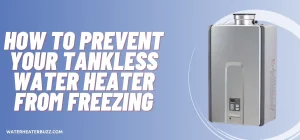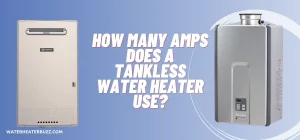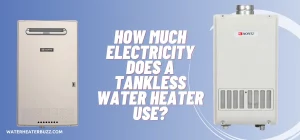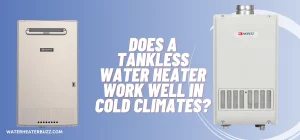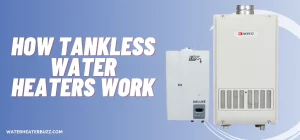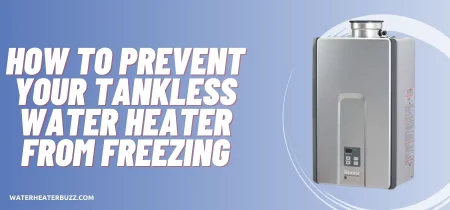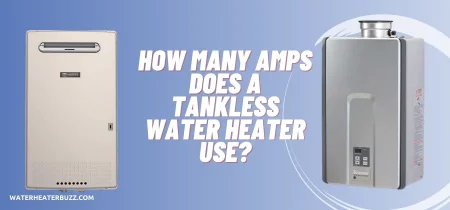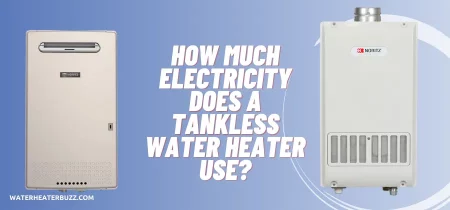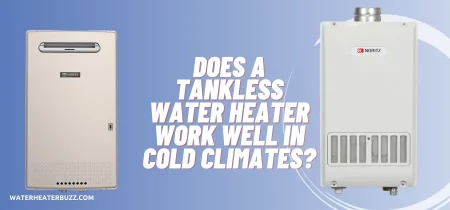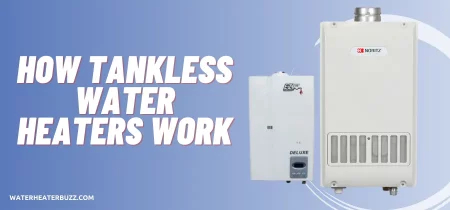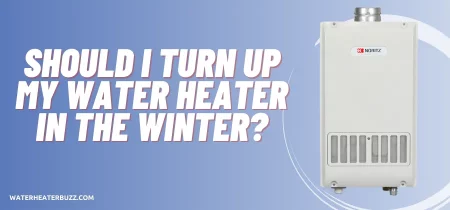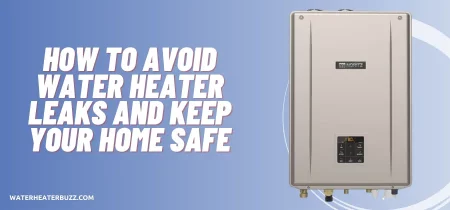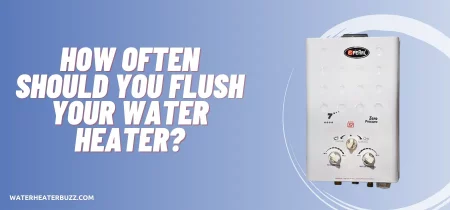Have you ever had a life and death experience where your body feels like a frozen iceberg and all you need is a hot bath that will restore the warm blood flow through your veins? You definitely did, because why else would you be here anyway? Things like this typically happen in the winters or in cold regions where snowfall can lower the bars of the thermostat below negative.
Believe me, I know how you feel. However, the main problem arises when you go about trying to get a simple water heater to replace the old one but get even more confused by the various types of water heaters presently available in the market. In those times, all you need is a person to tell you what you exactly need. So, let me be that person.
I am about to guide you through a very comprehensive guide that will help draw a clear pathway as to how to choose a tankless water heater as per your needs and requirements. So, keep on reading and relating to your situation to be able to decide better what you need. Enough with the chit chat, now let’s delve straight into the details.
What is A Water Heater
A water heater is a device that heats water domestically. It may run on electricity or gas, but the central concept is that it converts electric energy into heat energy or gas energy to heat energy depending upon the type of heater you are using. A water heater is usually in high demand in relatively colder regions, where you need hot water throughout for survival. It is convenient and efficient as it provides hot water instantly whenever you need it.
Types of Water Heater
Speaking about the types of water heaters, you will be amazed at the variety presently available in the market. There are round about five different types of water heaters, all with their own pros and cons. Each type of water heater has unique features that distinguish it from the rest. However, it is imperative to know the characteristics of each heater to decide which one you need. So, let’s go through each type of heater briefly.
1. Conventional Water Heater
It is the oldest and most popular type of water heater. It is mainly connected to a water tank, through pipes, where the hot water is stored after being heated. The best part about a conventional water heater is that it gives a spectacular performance no matter where you live. It means that it does not require any special conditions, such as solar, etc., for proper functioning. Moreover, it is a lot cheaper than other alternatives. However, it is much larger in size and is prone to water damage and leakage risks.
Pros
- Highly affordable
- Lower installation charges
- Ability to heat up an entire water reservoir
- Doesn’t require specific climatic conditions
- Highly efficient
- Reliable alternative
Cons
- Much larger in size
- High water damage and leakage risk
2. Tankless Water Heater
It is an excellent variant of a water heater. A tankless water heater has inbuilt super-heated coils that get filled with water the moment you press the button. It gives instant access to hot water without keeping you waiting for too long. Moreover, you get unlimited access to hot water using a tankless water heater. There are mainly two types of tankless water heaters these days in the market, i.e., those that run on electricity and those that run on gas. However, they both perform equally well for domestic purposes.
Pros
- Instant access to hot water
- Much compact in size
- Lightweight
- Helps in saving depletable energy resources
- Low running costs
- Less prone to water damage and leakages
Cons
- Highly expensive
- High installation costs
3. Heat Pup Water Heater
Heat pump water heater is a unique type of water heater that helps conserve energy resources efficiently and effectively. This water heater’s most noticeable and distinguishing feature is that it doesn’t run on either electricity or gas; rather, it siphons the heat energy from natural resources such as ground and surrounding air into the water, thus heating it up. It uses only a tiny amount of electricity to direct the heat from different locations towards the heater.
Pros
- Reduces carbon emissions
- Conservation of depletable resources
- Highly efficient
- Low maintenance cost
- Better safety
- Uses renewable energy resources
Cons
- High installation charges
- Relatively reduced lifespan
4. Solar Weter Heater
Solar water heaters are an excellent choice for all looking for a significant long-term investment. As you may have already guessed, solar water heaters convert solar energy into thermal energy, which is then used to heat up the water in the tank. A solar water heater basically consists of a roof-mounted panel that has water pipes inside. The solar panel absorbs the solar heat and transfers it to the water in the pipes inside. When the water heats up, it is transferred to the water tank or the reservoir.
Pros
- Uses renewable resources
- Excellent long term investment
- Highly durable
- Reliable performance
- Helps in the conservation of non-renewable resources
- Reduced utility bills
Cons
- High set up cost
- Only suitable for warm regions
5. Condensing Water Heater
You may at times confuse a condensing water heater with a conventional water heater because of their similar nature. However, they are very much different mainly because a conventional water heater uses electricity or gas to heat up the water. In contrast, a condensing water heater uses exhaust gases from the chimneys and vents and directs them towards the condensing water heater, thus heating up the water within.
Pros
Cons
Comparison Of Types Of Water Heaters
Each type of water heater is different from the other on the basis of qualities and features. For instance, Solar water heaters differ from all other types mainly because it runs on a renewable energy resource, i.e., sunlight. Buying a solar water heater will help you cut back on utility bills and qualify you for various rebates and tax credits. In comparison, electric and gas water heaters are the major sources of depletion of non-renewable energy resources such as natural gas.
Brands of water Heater
1. A.O. Smith Water Heaters
A.O. Smith is a renowned name that dominates the market with its high-quality water heaters. A.O. Smith Water Heaters are the number one recommendation of any plumber you ever seek advice, especially in North America. They are specifically engaged in the large-scale production of domestic and commercial water heaters. They offer a variety of water heaters, as mentioned below.
1. Tankless water heaters
2. Tank water heaters
3. Hybrid water heaters
4. Solar heaters
If you make a purchase with the A.O. Smith today, you are guaranteed to benefit from it in the long run. The excellent quality and durability offered by the water heaters of this brand are unmatched. So, if you want a reliable water heater, you should definitely consider getting an A.O. Smith water heater.
2. Kenmore Water Heaters
Kenmore is a brand founded in 1913 and has since diversified its operations into a broad product line. It is one of the globally renowned names that guarantee maximum customer satisfaction. Durability, excellent performance, reliability, you name it, and Kenmore covers it all. It manufactures water heaters, electric kettles, vacuum cleaners, and many more appliances. The best water heaters produced by this brand are stated as follows.
1. Hybrid water heaters
2. Natural gas water heaters
3. Propane water heaters
4. Electric water heaters
So, if you are looking for a tankless water heater, you must consider buying it from Kenmore. They have a longer lifespan and are excellent energy savers. Apart from that, Kenmore water heaters are highly efficient. However, you may feel like the Kenmore heaters are way too expensive, but the prices are worth the quality and features you get in return.
3. Bosch Water Heaters
Bosch is a German-based company that is quickly spreading its business around the globe. It is responsible for manufacturing almost all of the home appliances that modern people use in their homes. Amongst all the fantastic products, water heaters are one of them. The Bosch water heaters are excellent in terms of energy-saving and performance. They all have a great build and are highly reliable. It is safe to conclude that the Bosch water hearts are a perfect long-term investment.
4. Rheem Water Heaters
Three brothers, namely Richard, Donald, and William, cofounded the Rheem company in 1925. Since then, it has diversified its product range. In 1973 the company got split up. One of the two halves has been manufacturing water heater units since then. This intense focus on a single product led to specialization and thus resulted in one of the best water heaters you will ever come across. Rheem water heaters are specifically infamous for manufacturing the following water heaters.
1. Tankless water heaters
2. Heat pump water heaters
3. Electric water heaters
5. Solar water heaters
So, if you are looking for a perfect water heater that will also turn out to be an excellent long-term investment, I suggest you try out one of the Rheem water heaters. These water heaters are highly durable and reliable, not to mention highly efficient and low-maintenance.
5. EcoSmart Water Heaters
EcoSmart, as the name suggests, produces the most eco-friendly water heaters you will ever come across. They are highly efficient and reliable. They have a great build and provide excellent customer service. Ecosmart is the name behind almost all domestic water heaters these days. Ecosmart water heaters have a competitive edge over all other brands based on their unique, innovative designs and excellent energy saving.
6. Whirlpool Water Heaters
Whirlpool is a name that has meager beginnings, and the owners had to go through rough stages before it became one of the leading brands of water heaters. Today they stand in a position to proudly advertise their products as one of the best and most reliable in the market. They are excellent energy savers and help in the conservation of non-renewable resources. These water heaters have a long lifespan and have the best durability.
How To Maintain A Tankless Water Heater
With the passage of time, like any other thing, your tankless water heater may also become polluted with accumulated mineral gunk. And if you want your water heater to keep working at optimal levels, you must get a proper maintenance check at least every year. Tankless water heaters are hailed to be extremely low maintenance, but still, it is open to getting polluted. So follow a few simple steps to clear away all the accumulated minerals from your tankless water heater.
Step #1: Before getting started, unplug your tankless water heater from the power socket to eliminate the risk of possible electrocution.
Step #2: Next, you must turn off the water valves that supply water to the tankless water heater. This step will ensure that no water flows into or out of the heater while you are working on it. Moreover, make sure that you shut off all three valves of the heater for maximum safety.
Step #3: After that, move to the purge port valves and slowly and carefully remove the caps. However, before doing so, double-check the water valves because if they are not tightly shut, hot water will come rushing out of the purge port and may burn your skin terribly.
Step #4: The next thing you need to do is attach the hose lines with the water valves on the tankless water heater. The water hoses may have come along inside the box with the water heater, and if not, you can easily purchase them from any retail shop. However, you must get the correct size of the hoses so that they fit the valves.
Step #5: Once the hoses are tightly attached to the water valves, you can now open the port purge valves.
Step #6: Next, read the draining instructions and procedure written on the user’s manual accompanying the tankless water heater. Try to follow the instruction for the minute details because any miscalculation can lead to permanent damage to your water heater.
Step #7: Use undiluted white vinegar to grain through your tankless water heater mainly because any other chemical can prove to be very toxic to the human body. You definitely don’t want to fill your water heater with chemical radicals.
Step #8: Close the purge port valves once the draining procedure is completed.
Step #9: Next, disengage the hoses from the water valves.
Step #10: Put the caps of the purge port valve back on. Make sure to tighten the caps in place to prevent any possible leakages in the future.
Step #11: Finally, read the user’s manual very carefully for specific details on how to safely restart your water heater after the draining process is completed.
Things To Consider Before Buying A Water Heater
Capacity
Capacity is the first and foremost thing that you must consider while buying a tankless water heater. It is mainly because capacity is directly related to the number of users as well as the daily consumption level. In simple words, the more the users and the higher the consumption level, the greater the capacity heater is required and vice versa. So consider your need first while buying a tankless water heater because you definitely don’t want to run out on a hot water supply on a cold wintery day.
Quality
It is a given that you must check out the quality of the tankless heater before you buy it. However, pay special attention to the water pipes and the body material of the tank because, in most cases, a water heater gets severely damaged by mineral accumulation, especially in the places where hard water is supplied. So as a safety measure, always get a corrosion-resistant water heater.
Safety
Keeping in line with the famous saying, “ Better safe than sorry”, you must purchase a tankless water heater that offers maximum safety features. Safety is imperative to consider while you are buying home appliances because you definitely don’t want your house to burn down. For this purpose, always look for a safety valve in a tankless water heater because it will keep a good balance between ideal pressure and temperature.
Installation Area
Before deciding on a specific water heater, you must consider the space you have available for it. This is because there are all different sizes of heaters available in the market. However, you must get the size that fits your home. This consideration is crucial mainly because a water heater needs to be fixed in a spot with a constant supply of water.
Climate Considerations
Climatic conditions of your region play a vital role in your decision regarding buying a water heater. For example, if you live in a region where you get plenty of sunlight, you must purchase a solar water heater. On the other hand, if you don’t consider this factor, your purchase may turn out to be totally useless. For example, buying a solar heater in colder regions with a high precipitation rate is a huge mistake!
Frequently Asked Questions
What is the downside of a tankless water heater?
There are certain disadvantages of a tankless water heater. Starting off, the most discerning downside of a tankless water heater is the cost. It will cost you about three times more to purchase and install a tankless water heater than the one with a tank. The other main downside to it is that it requires electricity all the time to continuously provide you with hot water, which means no electricity, no hot water. Apart from that, it takes longer to heat up the water for you.
What size tankless water heater do I need for my family?
The size of the tankless water heater you will require for your family depends on two factors: occupants of the household and daily usage. If you have a family of two or three with high use, you must buy a tankless water heater with a forty to fifty Gallon capacity. However, if your family usage is regular or low, then a forty-gallon tankless heater would suffice.
How much should a tankless water heater cost with installation?
There are a number of different brands offering different models of tankless water heaters at different prices. However, on average, it may cost you somewhere between three hundred dollars to twenty-five hundred dollars depending upon the features and the quality you opt for. At the same time, installation charges are equally high. You can expect to get your brand new tankless water heater to be installed between a price range of three hundred to twenty-five hundred dollars.
Can you run out of hot water with a tankless water heater?
The answer to this question is both yes and no. Tankless water heaters heat up the water the moment you push the command button. It doesn’t keep a hot water store, so you will never run out of hot water. However, these heaters run on electricity, so whenever there is a power outage in your area, the heater will be unable to provide you with hot water.
Is it worth buying a tankless water heater?
There are certain characteristics of a tankless water heater that makes it absolutely worth buying. For example, it has a life expectancy of over twenty years, which means that it is an excellent long-term investment. Other than that, you get an unlimited supply of hot water as the heater heats up the water the instant you push the button. Besides, it takes up a lot less space than those with a tank and poses a lower risk of possible risk and water damage.
Conclusion
I hope I was able to clear all doubts you might be harboring before going through this article. Summing all things up, you must be very careful in choosing a tankless water heater. You shouldn’t just go for the looks and technology but also consider some other factors mentioned earlier.

